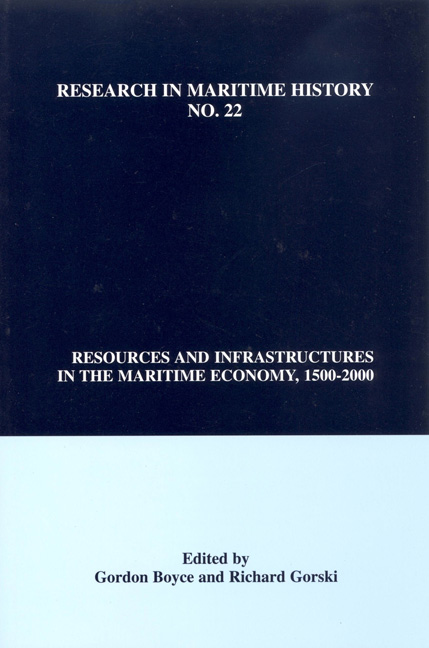Book contents
- Frontmatter
- Contents
- Contributors' Notes
- “Introduction: Resource Flows and Maritime Infrastructures”
- Part 1 Intangible Infrastructures and their Components
- Part 2 Resource Flows and Economic Development
- Part 3 Physical Infrastructures: Port Development and Planning
- “Economy, Traffic and Infrastructure in the Port of Genoa, 1861-1970”
“Centralised Port Planning: An Evaluation of the British and New Zealand Experience”
from Part 3 - Physical Infrastructures: Port Development and Planning
- Frontmatter
- Contents
- Contributors' Notes
- “Introduction: Resource Flows and Maritime Infrastructures”
- Part 1 Intangible Infrastructures and their Components
- Part 2 Resource Flows and Economic Development
- Part 3 Physical Infrastructures: Port Development and Planning
- “Economy, Traffic and Infrastructure in the Port of Genoa, 1861-1970”
Summary
To secure as much of the advantages of centralised power and intelligence as can be had without turning into governmental channels too great a proportion of the general activity - is one of the most difficult and complicated questions in the art of government.
J.S. Mill, On Liberty (London, 1859), 66.Introduction
Since the 1980s governments have been pursuing deregulation and privatisation to both reduce the size and increase the efficiency of the public sector. Large public enterprises like ports have been primary targets of these neo-conservative reforms. As part of this process, governments in both Britain and New Zealand abolished their central port agencies, which had been responsible for vetting decisions by port authorities to invest in major infrastructure. The British National Ports Council (NPC) and the New Zealand Ports Authority (NZPA) were dismantled in 1981 and 1988, respectively. Together with other reforms, especially privatisation, this move has led to a reduction in the degree of centralisation and government control of ports. British and New Zealand ports now enjoy considerable autonomy and freedom to compete, and they can freely invest in new facilities. There are claims, however, that port infrastructure in both countries is in danger of becoming overcapitalised. Clearly, there is a need to achieve a balance between administrative control and market forces.
Is there still a useful role for central port agencies? It is an opportune moment to consider this question given the World Bank's belief in the merits of an international port authority to coordinate investments in developing countries and the fact that the Malaysian government, for one, is currently giving thought to establishing a national port agency. As an important first step towards answering this question, this chapter appraises the performance of the NPC and NZPA, two of the most concerted attempts at central port planning. It is argued that in each case such attempts failed. To understand whether planning is in fact possible and more likely than market forces to lead to a socially-optimal port network, this chapter considers whether the failures of central port planners were due to contingent, context-specific causes or to inherent difficulties in central planning. The following section briefly surveys the arguments for and against attempts at centrally-planned port development. The case studies of the NPC and NZPA are then considered, followed by our conclusions.
- Type
- Chapter
- Information
- Resources and Infrastructures in the Maritime Economy, 1500–2000 , pp. 141 - 161Publisher: Liverpool University PressPrint publication year: 2002



